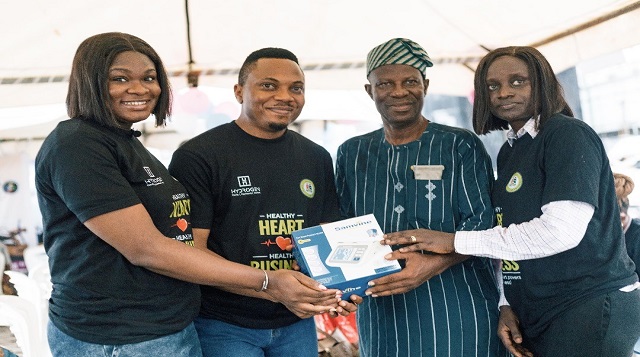General News
A Look at Emerging B2B E-commerce Trend

By Victor George
Twitter is now back in business in Nigeria. Having taken a hiatus from conversation on the bird app after the suspension by the federal government, I returned sometime last week. As usual, Twitter Nigeria is a no dull moment space.

The African Cup of Nations is on and memes were flying regarding the big name casualties of the tournament. African football powerhouse, Ghana was dumped out of the tournament at the group stage after losing to debutants, Comoros Islands. “What is a Comoros?” “Trouble be like Comoros” were some of the trending hashtags on twitter.
In the midst of the fun and banter, something caught my attention: a retweet popped up on my timeline of a tweet by @ajalayemi. It was something different from the flow of things in space.
The author of the tweet is based in Ibadan. His tweet was about branding by Alerzo Limited, a business-to-business e-commerce platform delivering goods with vans and buses. He was fascinated by what he saw and decided to do some little search about the company.
From his findings, Alerzo’s business model was designed to make business seamless for informal retailers. Unlike the Kongas and Jumias that connect sellers to customers, Alerzo is connecting informal retailers to direct supply from manufacturers. An informal retailer is that woman with the small shop on your street who sells almost everything.
Yoruba call them “gbogbo lowo”, meaning “I sell all you need”. These sellers are forced to close their shops when going to the market to restock. Some of them lose customers in the process. The stress of frequent market trips also takes a toll on them both mentally and physically. So what Alerzo service implies is that instead of market trips, they simply pick up their phones to restock, or order via Alerzo app and get their stocks delivered at their shops.
The idea sounded novel to me. I’ve not heard or seen such in Nigeria. At that point, I decided to do some digging about the company. Alerzo started off in Ibadan almost two years ago as a brainchild of the son of an informal retailer.
In one of his interviews, the Chief Executive Officer of Alerzo Limited, Adewale Opaleye said he witnessed first hand the ordeals of his mother who went through a lot to keep her retail business going while managing the family. He saw the gap that could be bridged by e-commerce technology and decided to make it a reality in Nigeria.
Alerzo is not the only company offering this type of service, there are others like Omnibiz, TradeDepot. Their services are already being enjoyed in other parts of the South West, North West and North Central. Apparently, I’ve been missing a growing trend, just like many of my readers right now.
Thousands of retailers are already enjoying the ease and convenience of e-commerce. Improved lifestyle, increase in profit and savings are the immediate benefits that come with the service.
On a broader scale, these platforms with their services will spike huge business activities in the digital space in the next few years. This is due to the fact that informal retail is a multimillion dollar business in Nigeria. Imagine the economic benefits Nigeria will derive from bringing just 50% of those retailers into the digital economy space.
The increasing rate of mobile phone adoption in Nigeria makes this a possibility. In 2021, the number of mobile internet users in Nigeria amounted to over 101.7 million, with over 32% using smartphones. The rate of smartphone usage is increasing and many of these sellers can afford the cheaper versions.
As a matter of fact, many informal retailers have tech savvy children who indirectly hijack their phones for games and internet surfing. With the help of these young ones, they can easily make their orders and get them delivered.
For all tech enthusiasts, this is an interesting trend to watch. There are reports of millions of dollars investment by external investors in the B2B e-commerce platforms. This shows the faith and belief that the model can work in the country. From all indications, there are interestings times ahead for informal retailers in Nigeria thanks to a new wave of innovators opening up the market to new possibilities.
Victor George, a tech enthusiast, writes from Lagos
General News
Uche Uzoebo, SANEF CEO Makes Case for More Financial Inclusion Strategies Targeting Women

Leveraging digital infrastructure is key to accelerating financial inclusion, especially through a multi-stakeholder approach involving governments, fintechs, telecoms, regulators and even the customers.

According to the World Bank report, a significant portion of the global adult population remains unbanked.
Specifically, 27% of adults globally are considered unbanked, and an additional 50% are underbanked, defined as lacking a credit card, , according to Lucidity Insights.
By investing in awareness, robust digital ID systems, interoperable payment rails, and inclusive policy frameworks, stakeholders can expand access to financial services, particularly in underserved regions, and reduce the global unbanked population significantly.
Stakeholders who gathered at the Regtech Conference 2025 discussed these strategies and more, especially facilitating cross-border payments and investment opportunities across Africa.
The event featured a thought-provoking panel discussion moderated by Uche Uzoebo, the Chief Executive Officer (CEO) of Shared Agent Network Expansion Facilities (SANEF) Limited.
The panel discussion themed, “From Borders to Bridges: Leveraging Digital Infrastructure to Drive Financial Inclusion through a Multi-Stakeholder Approach”, brought together diverse voices across banking, fintech, policy, and government to explore how digital infrastructure can be annexed to drive financial inclusion.
Uzoebo highlighted how women often face unique challenges in accessing financial services coupled with limited digital literacy and cultural barriers.
She engaged the panelists to discuss targeted interventions aimed at promoting gender inclusivity in the financial sector and effective financial education programs that empower individuals to utilize digital financial services.
Jacqueline Mpare, Head of Agency Banking, Ecobank Group, highlighted how her organization had established a women-focused initiative to provide support to businesses targeted at women and those with women as part of the leadership by providing them with access to finance and non-financial support.
Isa Aliyushata, Regional Advisor, Africa, Corum Group Limited, stressed the need to inculcate financial literacy into the education curriculum to ensure everyone is exposed to the knowledge of financial literacy from a young age.
The panelists include Ajibade Laolu-Adewale, Chief Partnership & Ecosystems Officer, Wema Bank; Gerald Munyaradzi Nyakwawa, Head of Digital Channels, MoneyMart Finance (Private) Limited, Zimbabwe; Dr. Henry Clarke Kisembo, Group Global Lead and Executive Chairman, Development Associates Link International (DALI); Jacqueline Mpare, Head of Agency Banking, Ecobank Group; Jean Jacques Kajuga, Chief Operations Officer, RSwitch Rwanda; and Isa Aliyushata, Regional Advisor, Africa, Corum Group Limited.
The panelists emphasized collaboration, leading by example, speed and legislative alignment, a unified infrastructure payment system, and collaboration between national and regional switchers to allow a low-cost cross-border payment as key to ensuring financial inclusion.
Meanwhile, her organization, Shared Agency Network Expansion Facilities (SANEF), was honored with the title of 2025 Financial Literacy Champion at the RegTech Awards. This prestigious recognition highlights SANEF’s steadfast commitment to promoting financial literacy and enhancing financial inclusion across Nigeria. Through strategic partnerships, the expansion of agent networks nationwide, and impactful educational programs, SANEF continues to equip millions with the knowledge and tools to make informed financial decisions.
General News
Hydrogen, Lagos State Touch Thousands of Business Owners with “Healthy Heart, Healthy Business” Outreach

As part of its continued effort to support the growth and sustainability of Nigerian enterprises, Hydrogen Payment Services Company Limited joined forces with Ikeja Local Government Area and the Office of the Medical Officer of Health to deliver the impactful “Healthy Heart, Healthy Business” outreach on Wednesday, May 28, 2025, at the Ikeja Local Government Secretariat.

The initiative successfully engaged a wide range of business owners through a combination of in-person participation and extensive digital awareness campaigns.
Participants benefited from a comprehensive range of free medical screenings, including blood pressure checks, ECGs, malaria and typhoid testing, urinalysis, packed cell volume (PCV), blood sugar monitoring, and more, highlighting the critical connection between good health and business longevity.
Kemi Okusanya, CEO of Hydrogen, commented on the initiative, affirming Hydrogen’s passion for the growth of businesses.
“At Hydrogen, we are deeply committed to the success of Nigerian businesses. As a payment solutions provider, we recognise that healthy entrepreneurs build stronger, more resilient enterprises. This outreach exemplifies our belief in supporting entrepreneurs beyond just payments.”
Demonstrating this responsibility, Hydrogen donated Sphygmomanometers and Glucometers to indigent and high-risk attendees unable to afford this essential health monitoring devices, empowering them to manage their health beyond the outreach.
Public-private partnerships (PPPs) have become increasingly important in driving sustainable development across various sectors.
By leveraging the unique strengths of both government institutions and private enterprises, PPPs enable more efficient delivery of services, innovation, and expanded reach. These collaborations foster shared responsibility and resource pooling, making it possible to tackle complex challenges that neither sector could effectively address alone.
Dr. Tawak O.F., Medical Officer of Health for Ikeja, spoke on this, saying, “This partnership with Hydrogen Payment Services Company Limited exemplifies the power of effective public-private collaboration in reaching the heart of our business community.”
“Entrepreneurs often overlook their health while striving for success, but initiatives like this remind us all that good health is an essential part of wealth. We commend Hydrogen for their commitment to not just powering payments, but also powering healthier, more resilient businesses through impactful community engagement,” She added.
Mary, one of the beneficiaries and a merchant in ‘Computer Village’, expressed her gratitude, saying that, “Most of us don’t think about regular hospital checkups. Mainly, because the cost is too high and some things now are not covered by insurance. Today, Hydrogen and Lagos State have brought doctors for free to our doorstep, and we are very grateful.”
Hydrogen’s full team presence at the event reaffirmed the company’s dedication to forging genuine relationships and standing firmly with the business communities it serves.
General News
Tripoint Travels Hosts Pre-GEC Brunch for Nigerian Delegates Ahead of Global Entrepreneurship Congress 2025

In a vibrant celebration of national pride, global relevance, and entrepreneurial drive, Tripoint Travels, the official logistics partner of GEN Nigeria hosted an exclusive pre-congress brunch for Nigerian delegates attending the upcoming Global Entrepreneurship Congress (GEC) 2025.

Held at Tripoint’s Lagos headquarters, the event brought together top entrepreneurs, investors, ecosystem leaders, and government officials, including Dr. Peter Bamkole, Deputy Vice Chancellor, Pan Atlantic University; Dr. Olawale Anifowose, Managing Director of the Global Entrepreneurship Congress Nigeria (GEN Nigeria); Dr. Babangida Ruma from The Katsina State Enterprise Development Agency (KASEDA), Mrs. Uche Uzoebo, CEO of the Shared Agent Network Expansion Facilities (SANEF) Limited; Actor and influencer Mr. Umar Gombe; along with other distinguished guests and representatives from various government bodies, all in anticipation of their journey to Indianapolis, Indiana this June.
The Global Entrepreneurship Congress (GEC), Organized annually by the Global Entrepreneurship Network (GEN), the GEC brings together more than 5,000 participants from over 200 countries, including Entrepreneurs, Investors, Policymakers, Researchers, & Support organizations to build stronger entrepreneurial ecosystems worldwide. Since its inception in 2009, the GEC has become a cornerstone of international collaboration and entrepreneurial innovation.
This year’s GEC, hosted in partnership with the Indiana Economic Development Corporation (IEDC), marks the Congress’ return to the United States after 16 years. Held in Indianapolis from June 2–5, 2025, the event aims to spotlight Indiana’s pro-growth business climate while strengthening global ties that promote sustainable economic development and innovation.
The brunch allowed the delegation to connect in an intimate and engaging setting, sharing expectations, ideas, and goals ahead of one of the most impactful convening in the global entrepreneurship calendar. Designed to build camaraderie, align visions, and foster a sense of shared identity, the event emphasized the importance of collaboration as Nigerian representatives prepare to take the global stage.
“The Global Entrepreneurship Congress is not just a conference, it’s a platform that is deliberate about global innovation meeting local action, said Mrs. Shuhda Muhammed, Founder of Tripoint Travels. We wanted to set the tone for our delegates, to ensure that they feel connected to this year’s theme – The Bold Change the World, as well as foster the necessary collaborations to make that happen at the local and global stage.. As a company rooted in both logistics and empowerment, we are proud to play a role in making their journey seamless and meaningful.”
Speaking at the event, Dr. Olawale Anifowose, Managing Director of the Global Entrepreneurship Network Nigeria (GEN Nigeria), emphasized the significance of the Global Entrepreneurship Congress (GEC) as both a meeting point and a growth platform, where Nigerian entrepreneurs engage with global ecosystems to connect, learn, and thrive. He noted that Nigeria’s presence at the GEC is not just symbolic but essential, reflecting the country’s growing influence in the global entrepreneurial landscape. Dr. Anifowose also commended Tripoint Travels for their pivotal role as a trusted partner in mobilizing Nigeria’s brightest talent and making the journey to GEC 2025 a reality.
GEN Nigeria has emerged as a critical force in supporting entrepreneurship at the grassroots and policy level, and with a Partner as Tripoint Travels, its expansive network and initiatives, continues to actively shape the country’s innovation landscape, championing inclusive growth, and equipping thousands of Entrepreneurs with the tools, exposure, and networks needed to succeed in both local and international markets.
With delegates selected for their contributions to Ecosystem building and Entrepreneurship, Nigeria’s representation at The GEC 2025 would reflect the country’s diversity, resilience, entrepreneurship spirit and creative potential. The presence of Founders and Innovators like Mr Rotimi Awofisibe – MD, VFD bank, one of the officially invited participants, is testament to Nigeria’s growing influence in the Global Entrepreneurship arena.
“We’re proud to be a longstanding partner of GEN Nigeria, supporting the Entrepreneurs shaping Nigeria’s future. Attending the Global Entrepreneurship Congress (GEC) is about learning, contributing, and returning with a renewed, broader vision. It’s through committed partnerships like ours that such visions become reality,” said Mrs. Muhammed.
More than just a travel management company, Tripoint Travels is a trusted enabler of dreams, mobility, and opportunity. As GEN Nigeria’s official travel partner for GEC 2025, Tripoint is overseeing every aspect of the delegation’s journey, from visa coordination and flight logistics to accommodation and ground transportation, ensuring a seamless and empowering experience.
Tripoint Travels also extends its commitment to ecosystem development through Tripoint Academy, its nonprofit arm that supports early-stage entrepreneurs with training, mentoring, and access to local and global opportunities. Tripoint’s partnership with GEN Nigeria reflects its broader mission: to use travel as a tool for empowerment, education, and national development.
“Every single ticket we issue is a bridge, a bridge between where someone is now, and where they’re meant to be,” added Mrs. Muhammed. “We don’t just book travel. We open up the world for Nigerian entrepreneurs.”
The highlight of the Pre-Congress brunch was the piece of art done by all the delegates present at the event. The interactive art was introduced as an inclusive way to showcase the multiculturalism and pivotal position of the Nigerian business mind, and so the essence of the Nigerian delegation materialised through the painting. The art work will be exhibited and gifted at a special event during the Congress.

 Telecom2 days ago
Telecom2 days agoMTN Nigeria Invests ₦900Bn in 2025 to Boost Network Quality in Lagos & Abuja

 E-Business2 days ago
E-Business2 days agoFirm Reports a 48% Increase in Malicious Packages Threatening Software Supply Chains

 News2 days ago
News2 days agoEFCC Witness Admits Writing Off Arik Air’s $2.3M Debt Amid N76Bn Fraud Trial

 Telecom2 days ago
Telecom2 days agoMTN Nigeria Wins Award for Best Use of Data @MarkHack 4.0 Awards Night

 E-Financial2 days ago
E-Financial2 days agoSenate Passes Harmonised Report on Tax Reform Bills

 News2 days ago
News2 days agoSERAP Urges National Assembly to Reject Tinubu’s $24Bn Loan Request Over Debt Concerns

 Broadcasting2 days ago
Broadcasting2 days agoThe Rave Revolution: How Gen Z and EDM Are Rewriting Nigeria’s Nightlife

 News2 days ago
News2 days agoAnambra Shines in 2025 E-Governance Rankings, Setting National Standards
























